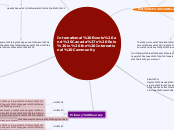International Events and Canada's Role in the International Community
Unit 4: Rwanda Crisis
Primary source
800 000 to 1 million were killed in 100 days
This shows just how much violence happened in 100 days
Summary
Rwanda broke out into violence in 1994 due to a few factors
Civil war that had lasted for 3 years between Tutsi rebels and the Hutu government
Some Hutu extremists shot down a plane carrying the president, and blamed it on the rebels
The U.N. pulled out most of it's troops after getting any foreigners to safety
The violence started with the government troops killing Tutsi, and some citizens got involved
How does it relate to unit 3?
Canadians tried to play a role in an international event as part of the U.N.
This happened in the Korean War
HTC's
Continuity is shown here when we allowed another genocide to happen
This event is historically significant because even though we don't talk about it, 1 million people dies in less than 4 months
Unit 2: Canada in the Netherlands
Summary
After D-Day, Canada got assigned with clearing the coast of the English Channel of the Germans, which included the Netherlands and Belguim
After it was clear the Germans were losing, they flooded the lowlands
The German generals surrendered on May 5, 1945
The Dutch send tulip bulbs to Ottawa as thanks each year to this day
Primary Source
7600 Canadian soldiers dies liberating the Netherlands
This shows how we could suffer these kinds of losses liberating such a small country, and still push through to get the job done
How does it relate to Unit 1?
We fought an important battle that helped ensure victory
This was similar to World War 1 when we fought at Vimy Ridge
Both were thought to be imposible
HTC's
Looking at this event through historical perspective, it was clear the Germans were desperate to keep the Canadians out of the Netherlands, so they fought very hard.
The cause for Canada attacking the Netherlands was their performance on D-Day, and the consequence was the Netherlands gratitude that extends to this day
Unit 3: Korean War
Summary
After World War 2, Russia occupied the northern half of Korea and set up a communist state
This state invaded the democratic South Korea in 1950
The U.N. sent an emergency force to oppose the North Koreans
After 3 years of war, the border was brought back to approximately where is was before the war
Primary Source
27 000 soldiers were sent, with 516 being killed and over 1000 being wounded
This shows how Canada played a significant role in preventing another world war by keeping this conflict in Korea
How does it relate to Unit 2?
Canad went into a foreign country to free it from an oppressive dictator
The same thing happened when Canada freed the Netherlands from the Nazis in World War 2
HTC's
This event can be seen through historical perspective because even though we were doing something good, the North Koreans didn't ask for us to get involved in their business
Russia and America influencing countries is the cause of this conflict, and the consequence is that conflicts like these pop up throughout the Cold War
Unit 1: Canada At Vimy Ridge
Summary
Canadian general Arthur Currie was assigned orders to capture Vimy Ridge in February 1917
He spent 2 months planning
He built railway lines to transport artillery
He built a scale model of vimy ridge for his troops to practice
he captured the ridge in 4 days over the Easter weekend
Primary Source
Out of 20 000 soldiers, there were 10 602 casualties with 3598 dead
It was heavily defended, but we took very little casualties compared to the other attempts to capture it. there were already hundreds of thousands of live lost on that ridge
How does it relate to Unit 4?
A canadian was present at both of these conflicts
They were both trying to do the right thing
HTC's
This is historically significant because Canada starts getting full autonomy from Britain because of their success in this battle
This shows change because Canadian generals used new tactics for the time
Primary Sources
Unit 4
Unit 3
J. Bradley Cruxton. W. Douglas Wilson, Spotlight Canada( Oxford University Press, Toronto, 2000) Pg. 295
Unit 2
J. Bradley Cruxton, pg. 245
Unit 1
